Iron equals energy: how the nutrient can boost your vitality and keep tiredness at bay
Iron’s main job is to re-energise the body by carrying oxygen from the lungs to every cell, so don’t neglect it – it’s also the most common nutrient deficiency in the world

Every now and then, my teenage boys acknowledge my nutrition education, admit that I might actually know something they don’t and ask me for advice. This week, they were complaining of being utterly exhausted, beaten up by the hours of forceful football practice. They found themselves doubting they possessed enough energy to finish all of that evening’s studying, let alone hit repeat the next day.
Four tips for losing weight, from adding vitamin B and omega 3 fats to your diet, to slower eating
Of course, there is no elixir that I can whip up to magically give them a second wind or make them feel as refreshed as after a good night’s sleep. I might offer my children natural remedies they often think are wacky, but I am no witch doctor.
I did suggest that they make certain they eat well during these long, tiring days and nights. I hinted that perhaps their choice to sleepwalk through breakfast, talk to their friends through lunch and rush through dinner might leave them without all of the nutrients – especially iron – that they need.
Why iron?
Iron equals energy. Iron’s main job is to help carry oxygen from the lungs to every cell in the body.
Beware those sexy diet quick fixes, moderation is the way to go – how to achieve it, and five obstacles to success
When you do not get enough oxygen to your cells, you are left feeling exhausted and weak. Iron deficiency is the most common nutritional deficiency worldwide, according to the World Health Organisation. It is the only nutrient deficiency which is also prevalent in industrialised countries. This is a significant public health concern in that even a mild iron deficiency can impair our lifestyle. Even if my guys are not actually iron deficient, giving their cells a little more oxygen certainly cannot hurt.